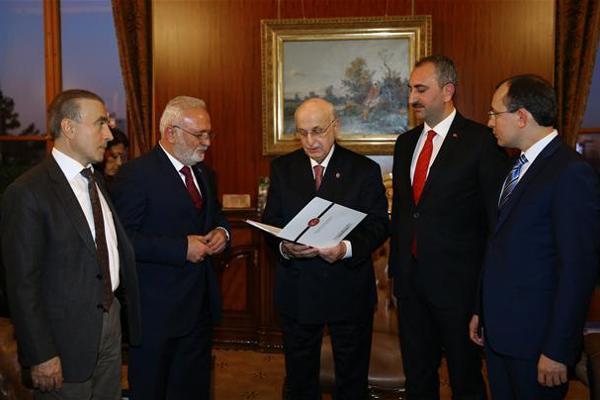AKP, MHP take major step for system change
ANKARA


The amendment, which was submitted to the parliamentary speaker on Dec. 10 for subsequent presentation to parliament, suggests granting the president the authority to issue decree laws, declare a state of emergency, rule the country with resolutions during states of emergency, appoint public officials and half of the top judges.
If the bill passes parliament, it will likely be submitted for a public referendum.
Stipulating a one-chamber parliament and preserving the country’s unitary system, the new system will annul the prime minister office.
Parliament’s right to audit the ministerial board and ministers, as well as the government’s right to issue decrees, will be abolished.
Parliament’s ways of obtaining information and supervision will also be rearranged. The “subjects dealing with state activity” are excluded from the scope of general meetings in the assembly. Written questionnaires written by deputies will be directed to the president’s assistants and ministers.
Scope of presidential decrees
According to the amendment, the president will issue a presidential decree on issues related to executive power. However, basic rights, personal rights and duties and political rights and duties cannot be regulated by the presidential decree. Also, presidential decrees cannot be enacted on issues that are regulated by law in the constitution and on matters that are clearly set within the law. If parliament issues a law on the same topic, the presidential decree becomes null and void.
Authority to declare state of emergency
The president will take the authority to declare the state of emergency from the cabinet. The state of emergency in the new constitution will cover the martial law present in the current charter. The president will also have the right to rule the country during a state of emergency by exercising presidential decree. With the request of the president, the parliament may decide to extend the period for four months at most. In the event of a war, this four-month time limit will not apply.
President to structure ministerial bodies and public institutions
The president will be given the authority to restructure all ministries and public institutions. “The authorities and responsibilities of the public institutions and organizations within the scope of the central administration are regulated by the president’s decree,” the amendment reads. The appointment principles of senior civil servants will also be arranged by the president’s decision.
5 of 12 members of top judges to be appointed by president
The Supreme Board of Judges and Prosecutors (HSYK) will be reduced from 22 to 12 members, while the chair of the board will again be the justice minister. The president will appoint five members of the board directly, while two members will be elected by the parliament, three members by the Supreme Court and one by the members of the Council of State.
President can be questioned by majority vote
The scope of the accountability of the president will also be widened. Under the proposed amendments, impeachment proceedings against the president could be commenced with the signatures of 301 deputies in the 600-seat parliament, which has 550 members in its current configuration. Parliament will be able to set up a commission of inquiry by secret ballot of 360 deputies. If the inquiry commission decides to send the president to the Supreme Court for a trial, the president will only be tried following a secret ballot of 400 deputies.
These provisions will also apply to the proposals brought to the parliament after the president’s term ends.
Renewal of elections unlikely without president’s will
Parliament will only be able to vote for general elections with 360 votes. There is only a slight possibility of going to an election in spite of the president. If the president decides to renew parliament, he will be elected in the same way.
If the president makes a call for a new parliament during his or her second term, he or she will be at liberty to pursue candidacy for a third time.
Three elections in 2019
The president will not be able to issue a decree until presidential elections scheduled for Nov. 3, 2019. Local elections will be held in March of the same year.
In the transition period until 2019, Erdoğan will be able to restore his ties with the AKP.
The constitution also lowers the age of election to 18, which will also take effect before 2019. Also, the reduction of the number of the members of the HSYK, the military judiciary and the Constitutional Court will go into effect before 2019.
